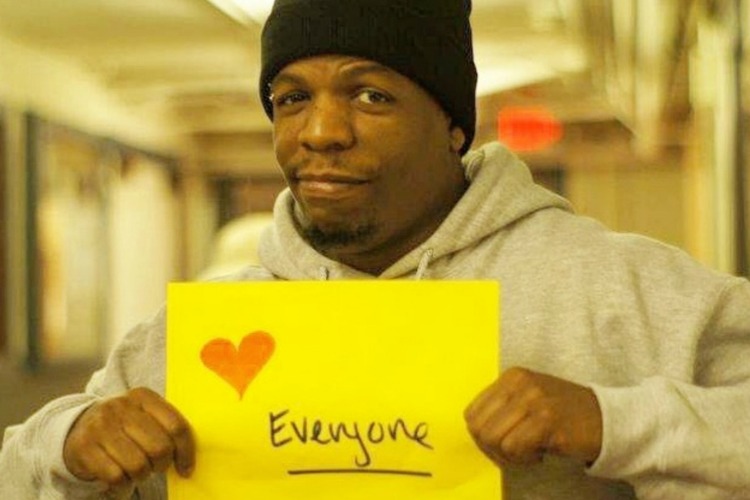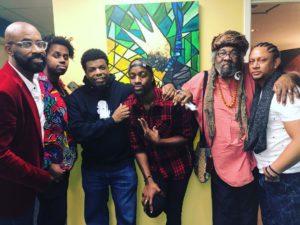
Surviving Marlon and Essex
Surviving Marlon and Essex
By Tim’m T. West, Membership and Programming Chair
Black Bear Brotherhood of Cincinnati
 This one is personal. In 1990 I was an intellectually curious, popular and insecure freshman at Duke University. I’d decided to circle the Bryan (Student) Center a few times to ensure none of my Black friends saw me. I’d heard third-hand buzz about a film, Tongues Untied (1989), that gave voice to communities of Black queer men, presenting their lived experiences as they confronted marginalization particularly though homophobia in the Black community and racism in the LGBTQ+ community. Tongues Untied broke artistic ground through its mix of spoken word, music, and performance alongside director Marlon Riggs’ autobiographical revelations. I finally made my way into the small theater to see the documentary that NC Senator Jesse Helms advocated should result in the defunding of PBS and National Endowment for the Arts. They’d found the film revolutionary and groundbreaking enough to offer it a platform in the wee hours of the night. Decades before I’d own the title of #BraveEducator, mustering the courage to see the film was a risk that would be prophetic…and surely change the trajectory of my life.
This one is personal. In 1990 I was an intellectually curious, popular and insecure freshman at Duke University. I’d decided to circle the Bryan (Student) Center a few times to ensure none of my Black friends saw me. I’d heard third-hand buzz about a film, Tongues Untied (1989), that gave voice to communities of Black queer men, presenting their lived experiences as they confronted marginalization particularly though homophobia in the Black community and racism in the LGBTQ+ community. Tongues Untied broke artistic ground through its mix of spoken word, music, and performance alongside director Marlon Riggs’ autobiographical revelations. I finally made my way into the small theater to see the documentary that NC Senator Jesse Helms advocated should result in the defunding of PBS and National Endowment for the Arts. They’d found the film revolutionary and groundbreaking enough to offer it a platform in the wee hours of the night. Decades before I’d own the title of #BraveEducator, mustering the courage to see the film was a risk that would be prophetic…and surely change the trajectory of my life.
I walked into the screening of Tongues Untied a closeted Black man, just a few years beyond a moment when I thought the only life worth living was to conform to compulsory heterosexuality or take my life. I walked out of the theater, ready to face whatever it would take to self-affirm as a Black queer man. I’d already endured so much of the opposite: being blackballed from the very Black fraternities I’d been told all my life would have my back, rebuked by religious institutions that mockingly loved the sinner but not my sin, and left to wander and wonder where I’d find my tribe. I did.
Tongues Untied forecasted the arrival of those who would come to be there for me. I just had to hang in there and let people show up for me, across lines of gender and race, various political affiliations, people who could see me fully, not in spite of who I loved, but because of who I loved. I had the opportunity to meet Marlon Riggs after the screening, hands trembling, wide-eyed: “I’m so honored to meet you Mr. Riggs.” “Marlon is just fine, young man. Thanks for coming through,” he responded. It was likely a forgettable moment for him…and for me an opportunity to see a reflection that suggested: You can have impact. You can change the world. He certainly did. I’m still trying.
I am forever grateful for the opportunity to meet both Marlon Riggs and his co-conspirator, friend, and renowned poet Essex Hemphill, before their respective deaths in the early 90s due to AIDS-related complications. Like Hemphill and Riggs before me, I have taken up personal arms against this unfortunate disease I’ve been fortunate enough to live to fight for the last 20 years. On occasion, I humbly encounter a young man of similar circumstance. He’ll approach me trembling and hand extended, enamored by the ways I, like Little to Juan in Moonlight, have morphed into my own savior. Still, while we may share a diagnosis and a creators’ tools for war, I’m hardly a Marlon or Essex. At this juncture in my artistic and personal life, even careless or ambitious comparisons are the greatest honors I can receive. I keep living because they deserve to keep living. No one is dead who is remembered.
To those in The Black Bear Brotherhood, I’ve seldom really had an opportunity to tell this story about Tongues Untied, but I wouldn’t exist, at least as most know me, without a Tongues Untied; and the call to action that film created for me, being one of the first instances where I, as an 18-year-old, saw self-affirmed Black queer men. After seeing it, I would go on to create a number of institutions—a luxury offered through the advancements of pharmaceutical medications that were not available when Riggs and Hemphill were diagnosed with AIDS. HIV among Black queer men is still a sad reality for far too many of us. According to the Centers for Disease Control and Prevention (CDC), one out of every two of Black gay men is projected to acquire HIV in his lifetime. One out of two.
These dark facts hang over us, shadowing our young and there every possible misstep. While working in education and with youth, under such prospects, I’m aware that the world we create for our students will determine whether or not many Black boys get to teach, be taught, simply survive, or better, thrive…beyond the grace of years offered to Marlon, Essex, or even my own borrowed time.

Daunting statistics aside, there is still a strength, endurance, and optimism that too is linked to the legacy of Tongues Untied, a sensibility and responsibility still informing my own journey. I’m still connected to the men who have survived since the debut of the film. In the years since, there has been evidence of my and their resilience: a pioneering queer rap group DDC, Brave Soul Collective, Sweet Tea Collective, BraveEducator, and other efforts to shift the world so that it’s a bit more kind and inclusive to Black boys like me who deserve a chance like everyone else to fulfill their potential. If it seems I’m always working, always going, there’s an urgency that drives me. Brother Marlon and Brother Essex… they did not have the luxury of time. I owe it to them to fight for equity and justice with the urgency of one who too believes tomorrow isn’t promised.
In December of 2018 in Oakland, I had an opportunity to take a photo with one of a few survivors from Tongues Untied, the Afro-folk legend Blackberri. He’s here, dredlocks seasoned and peppered like his colorful life, surrounded by generations of men—peers, the young, elders—those who recognize there is still much work to do. I’m grateful I work for an organization that enables me to live and lean into the calling to create a better world, not just for brothers like me, but all those connected to brothers like me. It’s with shameless affirmation that I say: “the world needs us to survive.”
